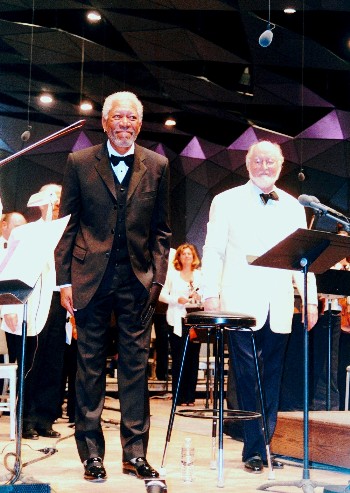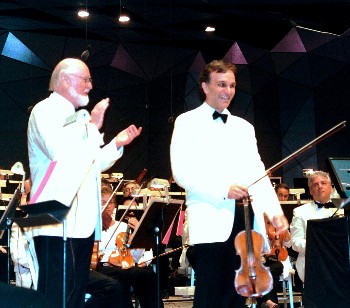Classical Music Review: Hooray for Film Night at Tanglewood
The Tanglewood team of Morgan Freeman, Gil Shaham, and John Williams served up an evening of memorable performances of music from the movies.
By Ron Barnell

Actor Morgan Freeman and conductor/composer John Williams — Hollywood comes to Tanglewood. Photo: Ron Barnell
This past weekend at Tanglewood John Williams and the Boston Pops Orchestra offered their annual concert night of music from the cinema. This year’s version proffered an eclectic mix of music from different genres with two expert guest artists and a very moving surprise tribute to one of Hollywood’s enduring legends.
On large, hi-def screens both inside and outside the Music Shed, concertgoers viewed selected film clips while Williams and the Pops played apt musical accompaniments. The audio-visual feast opened with Williams’ arrangement of “Hooray for Hollywood,” the multi-“click-track ” editing of the movie clips offering an exhilarating feel for the art of the film editor. The syncopated presentation of short segments came off like a helter skelter journey through the American Film Institute’s Top 100 Films of all time.
In “A Salute to the Hollywood Western,” Williams and the orchestra chose three selections that nicely highlighted this unique American genre. Williams’s score for the John Wayne film The Cowboys opened the segment, energetic brass fanfares and percussion serving as an overture to historic cattle drives across the vast open-prairies of the American west. More of that moving vision of the limitless prairie, though from a native American perspective, was supplied by the late John Barry’s theme from Dances with Wolves. Here the Pops string section produced a full-bodied sound that served the overtly sentimental quality of the music with aplomb.
Closing the tribute to the Hollywood western was a series of film selections that featured classic scores from the films of great directors such as John Ford and Fred Zinnemann. Screen favorites, from High Noon to the Sergio Leone classic Once Upon a Time in the West, were shown with Alfred Newman’s music for the Cinerama classic How the West was Won as the robust sound track.
Williams addressed the Tanglewood audience about his Oscar-nominated score for the 1969 film The Reivers, which starred Steve McQueen. He focused on how the narrator’s voice in the Faulkner novel, which chronicles the misadventures of a young boy in the South right after the turn of the last century, shaped his jazz-inspired music. He then introduced the acclaimed actor Morgan Freeman (Glory, Unforgiven), confessing that he has long admired his performances and his distinctive voice, which was made for telling American stories.
Years ago, I saw Williams conduct a performance of The Reivers, with noted character actor, Burgess Meredith, who had voiced the part of the narrator for the original screen soundtrack. I found Freeman’s interpretation of the narrator more sympathetic, his deep-voiced, whimsical delivery adding a playfully folksy edge to the score.
Following the intermission, Williams and the Boston Pops Orchestra were joined by noted violinist Gil Shaham for film music selections that included tunes from Steven Spielberg’s Holocaust epic Schindler’s List and excerpts from (appropriately) Fiddler On the Roof. Shaham’s violin skillfully evoked every poignant emotion called for by the Schindler’s List score, his deeply felt solo expressing the bitter sadness of the music.
Fiddler inspired exuberant playing from Shaham; with Williams and the Pops providing a lively musical background, the selections ranging from the Fiddler theme to “If I Were A Rich Man” and a richly melodic rendition of “Sunrise, Sunset.”
Williams then announced a work that was not listed on the program schedule. The “Tribute to Audrey Hepburn ” was a delightful surprise, Williams remarking that he had known this great lady and was eager to write music for a short tribute. Scenes from her films, such as Sabrina, Breakfast at Tiffany’s, and My Fair Lady, were interwoven with photos that displayed her elegant and delicate, natural beauty.
To close the concert, Williams played selections of his scores for the Star Wars films, providing a musical and cinematic retrospective of the George Lucas sagas. During the selections, photos were shown of the on-location Abbey Road recording sessions for each of the Star Wars films, starting with the original 1977 release and ending with the 2005 episode, Revenge of the Sith. It was amusing to watch Williams’s and Lucas’s hair turned increasingly gray over the years. The music, however, sounded as fresh as ever.
Tagged: Boston Pops Orchestra, John Williams, Morgan Freeman, Music, Ron Barnell, hollywood


